When Adam Eberl comforted Kumanjayi Walker as he lay dying on a police station floor, it wasn’t the first time he helped try to revive an Aboriginal man as his life slipped away before his eyes.
In many ways, the first two months of the inquest into the death of Kumanjayi Walker has been a study in contrasts, as repeatedly expressed in witness testimony through the now well-worn phrase “walking in two worlds”.
Those contrasts were never more stark than when Constable Adam Eberl took the stand to give evidence in the Alice Springs Local Court at around the midway point of the inquest last month.
The man who struggled with the 19-year-old Warlpiri-Luritja man on the floor of house 511 on November 9, 2019, as he was fatally shot by Constable Zach Rolfe.
The same man who then held the teenager’s hand and stroked his hair just a short time later as his life ebbed away on the floor of the Yuendumu police station.
His was, somewhat unexpectedly, among the most affecting testimony aired before Territory Coroner Elisabeth Armitage in the long-running inquest since Mr Walker’s family laid bare their grief in early September.
Constable Rolfe was acquitted on all charges in March over the 2019 police shooting death, and Constable Eberl, the other officer most intimately involved, took to the witness box, now for the third time after committal and trial, almost three years later.
Constable Eberl was not charged over the shooting and was not among the officers caught out in racist text exchanges with Constable Rolfe, via messages downloaded from his phone by investigators after he was charged with Mr Walker’s murder.
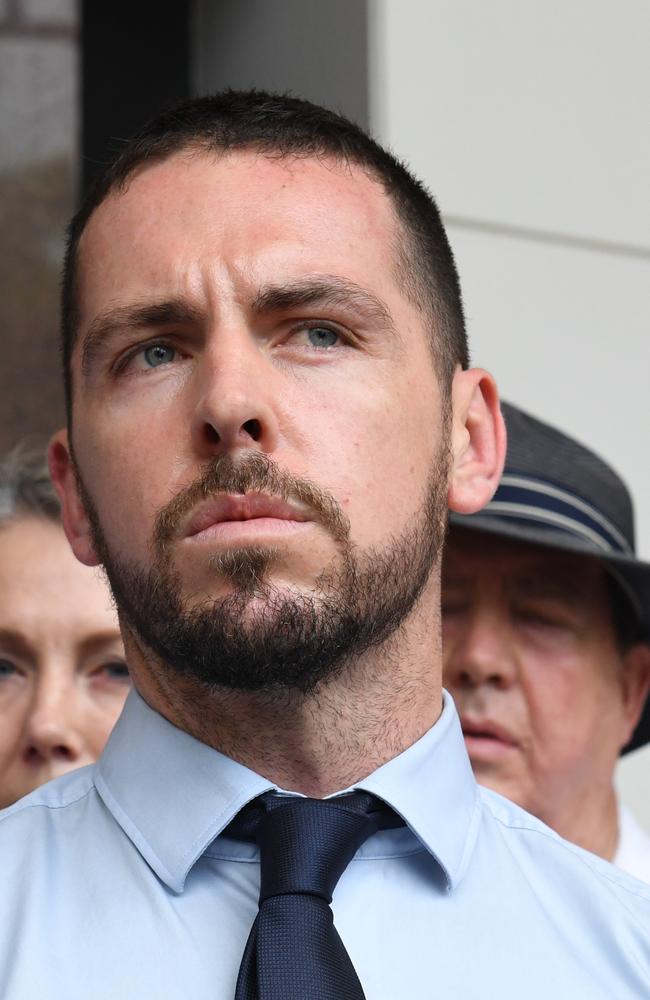
But nor had Constable Eberl endeared himself to the Yuendumu community, from the outset, having faced criticism for comments he made to an Aboriginal woman before the bungled arrest captured on body-worn camera footage played at the inquiry.
“Someone probably shouldn’t run at police with an axe,” he told Elizabeth Snape outside the unassuming red building now known as the “memory house”, in reference to an incident three days earlier in which an armed Mr Walker had rushed at police.
It came after Ms Snape expressed concern another officer, Senior Constable Anthony Hawkings, who was armed with an AR-15 assault rifle, had “got it aimed to shoot someone”, and moments before Constable Rolfe did just that with his Glock pistol.
Under questioning about the exchange by Counsel assisting the Coroner, Peggy Dwyer, Constable Eberl admitted it had “potentially” been confronting “to see a police officer carrying a long arm weapon, while she’s there with her children”.
He told Dr Dwyer he had reflected on the comment in the years since the shooting and now agreed that “on hindsight, (it) was probably not required — definitely.”
He accepted it was “uncalled for” and “potentially” sarcastic and that, “to a member of the community, who knew about what had happened on 6 November, it might look like police were there to retaliate for that”.
“Can you understand, from her perspective as a member of the community, standing there with her children, that she might think that police were there to exact some revenge for what happened on 6 November?” Dr Dwyer asked.
Constable Eberl agreed that while that was “not what (he) meant”, it was “a good reason why you have to be particularly professional in those circumstances”, and he “should have shown more empathy”.
“You know, if I saw her, I’d apologise for saying that, and you know, (it would) probably be a little bit scary, I suppose, for her children and things like that, so yeah,” he said.
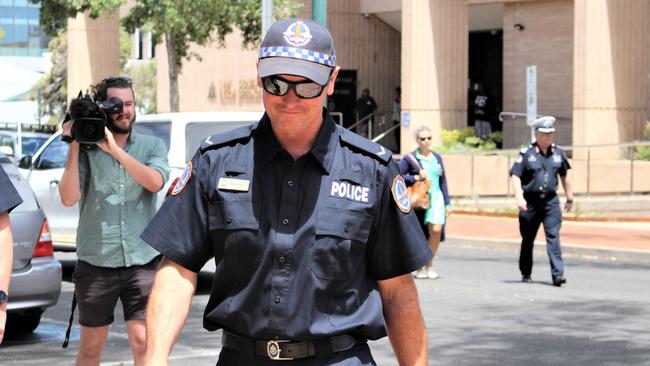
“I sort of came around and then tried to grab him from behind. That way he can’t fight from behind because you’re not designed to fight backwards. I heard a couple of loud bangs, like boom — boom.”
Constable Eberl told the inquest he had joined the NT Police in 2015 after a three-year stint with the South Australian constabulary, working in community and youth engagement in Alice Springs for a couple of years.
He said he’d only done about six weeks relief work in remote Aboriginal communities before joining the Immediate Response Team that would later be deployed to Yuendumu, along with constables Rolfe, Hawkings and James Kirstenfeldt in November 2019.
But unlike most of the non-Indigenous witnesses called so far, Constable Eberl did not tell the court he had only very limited interactions with Aboriginal people before moving to the Northern Territory.
When he “tried to grab” Kumanjayi Walker, who was now armed with a small pair of scissors, immediately before the shots were fired, Constable Eberl said he used a modified version of a technique known in policing as a “seatbelt hold”.
“And you said you modified your technique. Is that because you’ve had particular training elsewhere?” Dr Dwyer asked.
“Potentially, it could’ve been,” Constable Eberl replied.
“I was just staying in control of his arm, to stay away from the weapon when I saw it (in his hand).”
And that was where his evidence took an unexpected turn.
“You’ve had specific training, above and beyond your police training, in martial arts, is that right? Can you tell her honour about that?” Dr Dwyer asked.
Along with “a bit of training within Brazilian jiu-jitsu” and “some aikido”, Constable Eberl told her he also knew a few “wing chun techniques”.
“And also I’ve had training, for about a decade, in an Aboriginal martial art called Ramindjeri martial arts,” he said.
Constable Eberl told the Coroner Ramindjeri land stretches “from the Murray mouth, up near Victor Harbour, right down around Kangaroo Island, and along the coast up to the Torrens”.
And he knew this through a connection he made with “an Aboriginal elder from that community” before he started with his previous employer, the South Australian police force.
“I moved in next door (to him), and found that he was interested in martial arts,” he said.
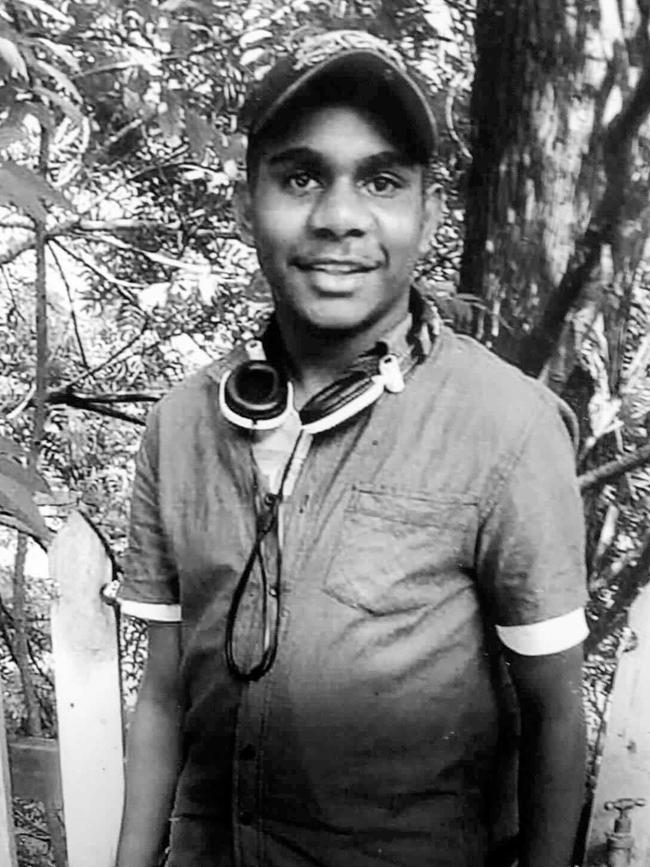
“I had a particular, an old item, that I wasn’t using any more, that I used to use for martial arts, and I thought ‘Oh he could use that, since he likes, you know, those sorts of things’.
“I presented it to him, and just gave it to him, and that’s when he wasn’t going to take it for nothing, and said ‘Oh, this for knowledge then?’; and I’m like, ‘OK’, I was a bit of an open book, so yeah.”
From there, and despite only being aged in his mid-20s, Constable Eberl said he struck up a perhaps unlikely friendship with the older man and the pair began training together.
“And he started, you know, sharing, not only the martial arts, but part of the spiritual you know, journey, with the Ramindjeri people,” he said.
“And he eventually taught me a ceremony, which was, you know, which he hadn’t even taught to his own son.”
Over the next decade, Constable Eberl said the Elder “basically turned into a best friend” who “taught me many, many great things”, and before the young officer “was there in his last hours”, he sought his mentor’s blessing for his chosen career.
“He was doing martial arts at the time, helping out with a grading, and yeah, he fell down with a heart attack, and we weren’t able to revive him,” he said.
“I knew he had a number of issues when he was growing up, you know, with the law, and things like that.
“So when I applied to be a police officer, when I was going to apply, I actually asked him what he thought, because I knew that he’d had some negative run-ins, and he gave me (his) blessing to do it.”
Constable Eberl said that formative relationship and the knowledge his old friend had passed on had been an invaluable asset when he was later policing remote communities in the NT.
“When a tribe or a community group was going to travel to another community group, they would stop on the border, and they would light a fire to attract the community to ask permission to walk their land,” he said.
“And that’s what I do when I go and work somewhere, I ask permission to walk their land, seek out the Elders of the area, and it shows respect.”
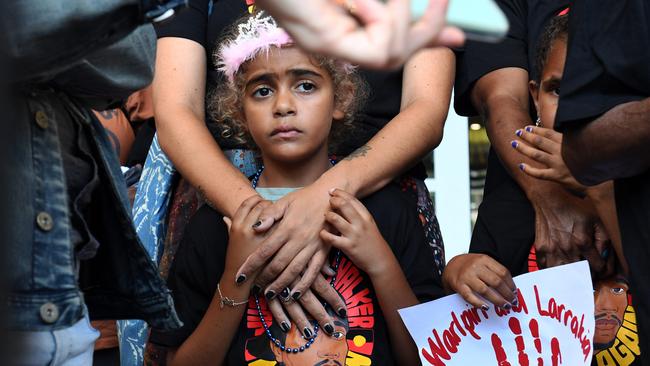
After the fatal shooting, and a subsequent committal hearing in Alice Springs in September 2020, Constable Eberl finally got his chance to take charge of his own police station in the remote community of Arlparra.
But there was a problem. The court proceedings and Constable Eberl’s evidence there had been all over the news, so he knew he was going to have some explaining to do.
He learned that when conflict arose, or a person’s actions were called into question, a community meeting would be called, “so out of respect to the community, I also did the same thing”.
“They will explain what happened and then the person would go away and then the community would talk about, you know, what’s going to happen to that person, whether they get punishment or whatever it might be,” he said.
“After the committal hearing was here, obviously, the evidence was out there in the public, so then I presented in front of the community members in Arlparra and I also explained my involvement in the incident at Yuendumu.
“(I) left the room, and then all the community members spoke about it and then came in and they still accepted me and you know, they knew that I wasn’t the one that had fired the gun and so they were happy to keep me there.”
It was thus, Constable Eberl said, he was able to take over the station with the consent of those whose conduct he was policing, and this time, his time in community would not end in tragedy.
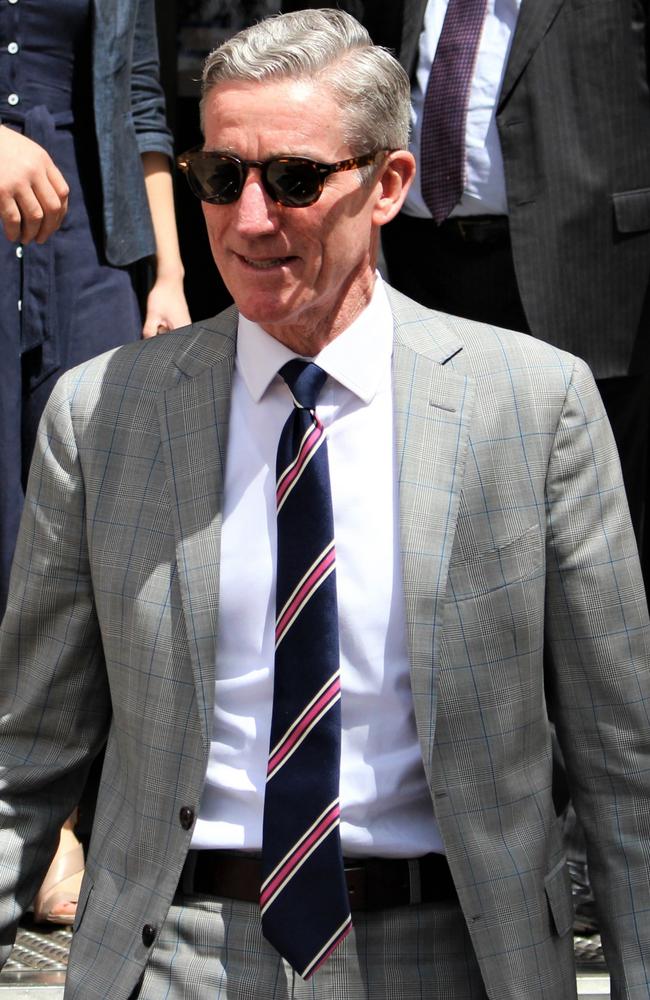
“They didn’t want this sort of thing to happen anywhere and they didn’t want it especially out there, and so they asked if you come to community and you’re looking for someone and there was particular Elders that we could speak to that knew most of the people in community and then they would say, you need to go and speak to this family member,” he said.
“And then you would go there and speak to the parents, if we were looking for an arrest target, and then they would present him to us and we’d do it peacefully like that.”
But despite his positive relationships with Indigenous Australians, forged both before and after the shooting, under questioning by lawyers for family members of Kumanjayi Walker, Constable Eberl was forced to admit his better judgment had failed him on that fateful night as the sun set over Yuendumu.
“You told counsel assisting that you learnt from a friend about the importance of respect, of speaking to Elders before you came onto country, and so on, in dealing with Indigenous people, is that right?” Brown family lawyer, Gerard Mullins, asked.
“And that was before — correct me if I’m wrong — that was before 9 November (2019) that you’d had those learnings?”
Constable Eberl agreed — but Mr Mullins wasn’t done, saying: “I suggest to you that you didn’t apply any of that on 9 November”.
“No, I did not,” Constable Eberl responded.
“And I suggest to you that the talk about your appreciation of the respect that needed to be shown to Indigenous people was not on show on the evening of 9 November 2019, do you accept that?”
“Sure.”
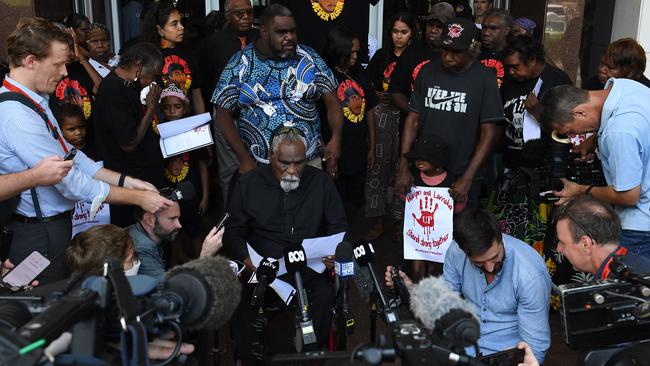
There are few people better versed in Warlpiri culture than Ned Jampijinpa Hargraves, but there are times when he too finds himself squeezed in that cramped space between two worlds.
Speaking on the steps of the Supreme Court on the first day of Constable Rolfe’s trial in February this year, the senior Yuendumu Elder had to be reminded of the niceties of the Western legal system after he announced to assembled media that “We want to put a spear across (his) legs!”.
But with the trial over and a verdict in, and no longer an impressionable jury to protect from outside commentary, Mr Hargraves again revisited the theme when addressing Ms Armitage on day one of the inquest almost seven months to the day later.
“For example, my young sister passed away, a man had done something very, very bad … she passed away, but the man had to pay the punishment,” he said.
“We call that, at that moment, we called it, parumpurru. Parumpurru. And I’ll give you the answer for that one. It means justice. Justice. In our culture, parumpurru is the answer. It was the answer. It was the only answer.
“When that was done, and the spear, had to solve it. He had to get a spear. Thrust through legs. Not one, not two times. Ten. When the blood was sown then the family, the community, that was a sign of peace. It was sign for karrinjarla muwajarri. It was time, karrinjarla muwajarri, meaning cease fire. It was meaning end of story.

“It’s back to you and me, family, living, loving, caring, sharing. Doing the things that our people taught us. To keep the culture very strong. That was parumpurru. That was the justice. It wasn’t a gun to solve the problem. It wasn’t a shotgun to solve the problem. It was a spear across the legs.”
But just moments later, Mr Hargraves would strike a more conciliatory tone, telling her honour “we want the police” in Yuendumu — albeit, in another sticking point between yapa (Warlpiri) and kardiya (non-Indigenous), disarmed of their guns.
“We like the police, because they help both the law, we want them there, and we want to be able to work together,” he said.
“We want to teach, not because kardiya policemen are always right, but I must say, some of them are stupid, they don’t want to listen to you and me,” he said.
“But somewhere along the line we’ve got to find that answer. We must work together to make it a community that is safe for our children to live.”

Territory Coroner Elisabeth Armitage will have a herculean task ahead of her when she finally sits down to sort through the lessons of the months-long inquest, now not due to conclude until March next year.
But whatever the path forward looks like, men like Adam Eberl and Ned Hargraves, complete with all their conflicts and contradictions, and the friction that remains inherent in walking between worlds — black/white, yapa/kardiya, life/death — must surely be a part of the solution.
The Coronial inquest into the death of Kumanjayi Walker will reconvene in Yuendumu on Monday, with Constable Rolfe scheduled to testify in the Alice Springs Local Court later in the week.


‘It’s a coup’: ‘Terminated’ Alice Springs principal’s explosive allegations
The former principal of troubled Alice Springs school is alleging he was sacked after standing his ground over a proposal which is going to be ‘a sh-t show’.
Gaps in Darwin maternity services highlighted through stories of loss
Darwin families are making plans to leave the NT as shocking testimonies reveal gaps in maternity care, with some mothers seeking help four times before tragedy struck.